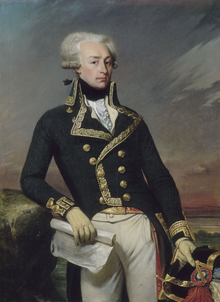Marie-Joseph Motier, Marquis de La Fayette
| Marquis de Lafayette | |
|---|---|

Lafayette as a lieutenant general, in 1791. Portrait by Joseph-Désiré Court
|
|
| Birth name | Marie-Joseph Paul Yves Roch Gilbert du Motier de Lafayette |
| Nickname(s) | The Hero of the Two Worlds (Le Héros des Deux Mondes in French) |
| Born |
6 September 1757 Chavaniac, France |
| Died | 20 May 1834 (aged 76) Paris, France |
| Buried at | Picpus Cemetery |
| Allegiance |
|
| Service/branch | |
| Years of service | 1771–1792 1830 |
| Rank |
|
| Battles/wars |
July Revolution |
| Awards | Order of Saint Louis |
| Relations |
|
| Other work |
|
| Signature |  |
|
|
Marie-Joseph Paul Yves Roch Gilbert du Motier, Marquis de Lafayette (French pronunciation: [maʁki də la fajɛt]; 6 September 1757 – 20 May 1834), in the U.S. often known simply as Lafayette, was a French aristocrat and military officer who fought in the American Revolutionary War. A close friend of George Washington, Alexander Hamilton, and Thomas Jefferson, Lafayette was a key figure in the French Revolution of 1789 and the July Revolution of 1830.
Born in Chavaniac, in the province of Auvergne in south central France, Lafayette came from a wealthy landowning family. He followed its martial tradition, and was commissioned an officer at age 13. He became convinced that the American cause in its revolutionary war was noble, and traveled to the New World seeking glory in it. There, he was made a major general; however, the 19-year-old was initially not given troops to command. Wounded during the Battle of Brandywine, he still managed to organize an orderly retreat. He served with distinction in the Battle of Rhode Island. In the middle of the war, he returned home to lobby for an increase in French support. He again sailed to America in 1780, and was given senior positions in the Continental Army. In 1781, troops in Virginia under his command blocked forces led by Cornwallis until other American and French forces could position themselves for the decisive Siege of Yorktown.
...
Wikipedia
